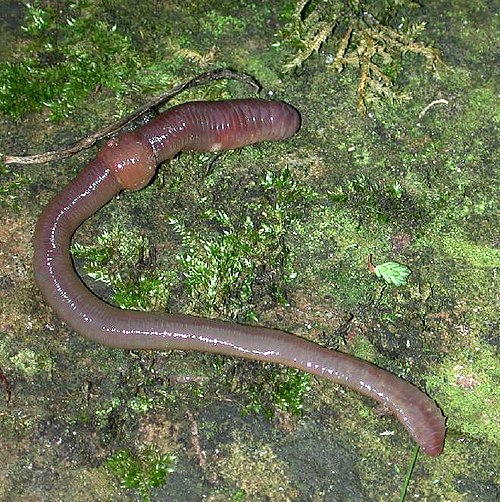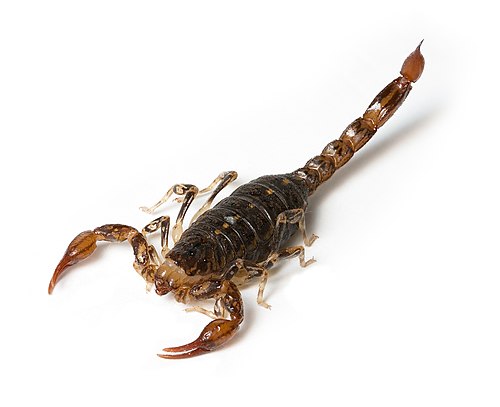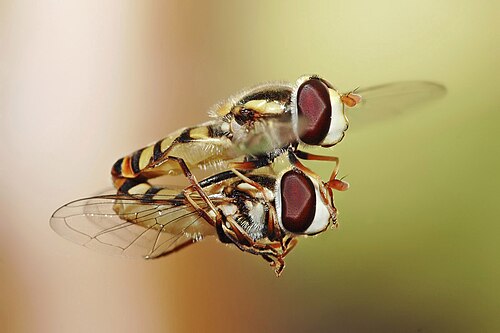Wormnoun
A generally tubular invertebrate of the annelid phylum; an earthworm.
Wormnoun
More loosely, any of various tubular invertebrates resembling annelids but not closely related to them, such as velvet worms, acorn worms, flatworms, or roundworms.
Wormnoun
(archaic) A type of wingless "dragon", especially a gigantic sea serpent.
Wormnoun
Either a mythical "dragon" (especially wingless), a gigantic sea serpent, or a creature that resembles a Mongolian death worm.
Wormnoun
A contemptible or devious being.
Wormnoun
(computing) A self-replicating program that propagates through a network.
Wormnoun
(cricket) A graphical representation of the total runs scored in an innings.
Wormnoun
Anything helical, especially the thread of a screw.
Wormnoun
A spiral instrument or screw, often like a double corkscrew, used for drawing balls from firearms.
Wormnoun
The spiral wire of a corkscrew.
Wormnoun
(anatomy) A muscular band in the tongue of some animals, such as dogs; the lytta.
Wormnoun
The condensing tube of a still, often curved and wound to save space.
Wormnoun
A short revolving screw whose threads drive, or are driven by, a worm wheel or rack by gearing into its teeth.
Wormnoun
(obsolete) Any creeping or crawling animal, such as a snake, snail, or caterpillar.
Wormnoun
(figuratively) An internal tormentor; something that gnaws or afflicts one’s mind with remorse.
Wormnoun
(math) A strip of linked tiles sharing parallel edges in a tiling.
Wormnoun
(anatomy) The lytta.
Wormnoun
A dance, or dance move, in which the dancer lies on the floor and undulates the body horizontally thereby moving forwards.
Wormverb
(transitive) To make (one's way) with a crawling motion.
Wormverb
(intransitive) To move with one's body dragging the ground.
Wormverb
To work one's way by artful or devious means.
Wormverb
To work (one's way or oneself) (into) gradually or slowly; to insinuate.
Wormverb
To effect, remove, drive, draw, or the like, by slow and secret means; often followed by out.
Wormverb
To drag out of, to get information that someone is reluctant or unwilling to give (through artful or devious means or by pleading or asking repeatedly).
Wormverb
To fill in the contlines of (a rope) before parcelling and serving.
Wormverb
(transitive) To deworm (an animal).
Wormverb
(transitive) To cut the worm, or lytta, from under the tongue of (a dog, etc.) for the purpose of checking a disposition to gnaw, and formerly supposed to guard against canine madness.
Wormverb
(transitive) To clean by means of a worm; to draw a wad or cartridge from, as a firearm.
Wormnoun
A creeping or a crawling animal of any kind or size, as a serpent, caterpillar, snail, or the like.
Wormnoun
Any small creeping animal or reptile, either entirely without feet, or with very short ones, including a great variety of animals; as, an earthworm; the blindworm.
Wormnoun
An internal tormentor; something that gnaws or afflicts one's mind with remorse.
Wormnoun
A being debased and despised.
Wormnoun
Anything spiral, vermiculated, or resembling a worm
Wormnoun
A spiral instrument or screw, often like a double corkscrew, used for drawing balls from firearms.
Wormverb
To work slowly, gradually, and secretly.
Wormverb
To effect, remove, drive, draw, or the like, by slow and secret means; - often followed by out.
Wormverb
To clean by means of a worm; to draw a wad or cartridge from, as a firearm. See Worm, n. 5 (b).
Wormverb
To cut the worm, or lytta, from under the tongue of, as a dog, for the purpose of checking a disposition to gnaw. The operation was formerly supposed to guard against canine madness.
Wormverb
To wind rope, yarn, or other material, spirally round, between the strands of, as a cable; to wind with spun yarn, as a small rope.
Wormnoun
any of numerous relatively small elongated soft-bodied animals especially of the phyla Annelida and Chaetognatha and Nematoda and Nemertea and Platyhelminthes; also many insect larvae
Wormnoun
a person who has a nasty or unethical character undeserving of respect
Wormnoun
a software program capable of reproducing itself that can spread from one computer to the next over a network;
Wormnoun
screw thread on a gear with the teeth of a worm wheel or rack
Wormverb
to move in a twisting or contorted motion, (especially when struggling);
Worm
Worms are many different distantly related animals that typically have a long cylindrical tube-like body, no limbs, and no eyes. Worms vary in size from microscopic to over 1 metre (3.3 ft) in length for marine polychaete worms (bristle worms), 6.7 metres (22 ft) for the African giant earthworm, Microchaetus rappi, and 58 metres (190 ft) for the marine nemertean worm (bootlace worm), Lineus longissimus.
Insectnoun
An arthropod in the class Insecta, characterized by six legs, up to four wings, and a chitinous exoskeleton.
Insectnoun
(colloquial) Any small arthropod similar to an insect including spiders, centipedes, millipedes, etc
Insectnoun
(derogatory) A contemptible or powerless person.
Insectnoun
One of the Insecta; esp., one of the Hexapoda. See Insecta.
Insectnoun
Any air-breathing arthropod, as a spider or scorpion.
Insectnoun
Any small crustacean. In a wider sense, the word is often loosely applied to various small invertebrates.
Insectnoun
Fig.: Any small, trivial, or contemptible person or thing.
Insectadjective
Of or pertaining to an insect or insects.
Insectadjective
Like an insect; small; mean; ephemeral.
Insectnoun
small air-breathing arthropod
Insectnoun
a person who has a nasty or unethical character undeserving of respect
Insectnoun
a small arthropod animal that has six legs and generally one or two pairs of wings
Insectnoun
any small invertebrate animal such as a spider or tick.
Insect
Insects or Insecta (from Latin insectum) are pancrustacean hexapod invertebrates and the largest group within the arthropod phylum. Insects have a chitinous exoskeleton, a three-part body (head, thorax and abdomen), three pairs of jointed legs, compound eyes and one pair of antennae.





























